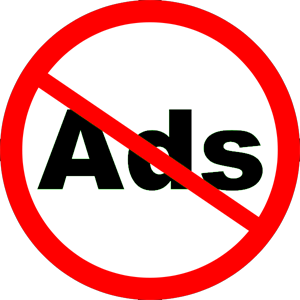Bring me to the Ads-Free era!!!
If I can choose between a year without ads and a month full of depressing weather such as raining or snowing, I will gladly accept the second one. Ads for clothes, books, furniture, shampoo, tools, baby powder… are all over the World Wide Web now. Honestly I understand that many websites use ads as a way of keeping low costs of free access to certain services for users. It is a trade-off. If you do not want to listen to a ‘School of Massage’ ad in the middle of your favorite station on Pandora, you can, well, pay for Pandora to block the ads. I usually just wait a minute or so until the ad is over and continue with my jam. The same action also applies when I use other websites. However, as I surf online, I realize that the ads getting to be more and more relevant to me. It occurs to me that it knows my status and understand my behaviors or my pattern of searching. The truth revealed, I am not alone. Facebook can take our information and sell it to advertising companies to target potential customers. You can read more about the article here.
 By studying the users’ information, advertising companies can figure out their potential customers’ search behaviors, then contact the companies that provide search engines (Google, Bing, Yahoo, Facebook, YouTube, etc.) , and choose to pay per click or set prices depending on their valuations*. By matching the companies with the spots on the search pages, mothers will receive ads for baby clothes, toys, and/or anything family-related products while college students will receive ads for student loans, school of physical therapy, cheap book renting, etc. Certainly, there is a higher chance for the targeted users to click on the ads if the ads are relevant and “right on the money.” There is nothing wrong with advertising companies trying to make money by targeting users; it is, after all, just a business strategy.
By studying the users’ information, advertising companies can figure out their potential customers’ search behaviors, then contact the companies that provide search engines (Google, Bing, Yahoo, Facebook, YouTube, etc.) , and choose to pay per click or set prices depending on their valuations*. By matching the companies with the spots on the search pages, mothers will receive ads for baby clothes, toys, and/or anything family-related products while college students will receive ads for student loans, school of physical therapy, cheap book renting, etc. Certainly, there is a higher chance for the targeted users to click on the ads if the ads are relevant and “right on the money.” There is nothing wrong with advertising companies trying to make money by targeting users; it is, after all, just a business strategy.
 In other words, the targeted ads are fine; it’s just the issue about the privacy of users that concerns and stirs the discussion in the online community. We put our information on Facebook with the intention to share with families and friends; we do not want advertising companies knowing those information to give us more ads. We want our privacy to be protected. The truth is, what we want may not be in the best interests of advertising companies or the corporations that provide us the search engines. In the small scope of this blog post, I just wish you consider this topic next time you type in something inside the search box. I don’t know, but perhaps an ad is running behind one of your browser tabs right now, and maybe one of them is a video playing automatically before your searched video of “Bunny Eating Raspberries!” starts.
In other words, the targeted ads are fine; it’s just the issue about the privacy of users that concerns and stirs the discussion in the online community. We put our information on Facebook with the intention to share with families and friends; we do not want advertising companies knowing those information to give us more ads. We want our privacy to be protected. The truth is, what we want may not be in the best interests of advertising companies or the corporations that provide us the search engines. In the small scope of this blog post, I just wish you consider this topic next time you type in something inside the search box. I don’t know, but perhaps an ad is running behind one of your browser tabs right now, and maybe one of them is a video playing automatically before your searched video of “Bunny Eating Raspberries!” starts.
*Chapter 15: Sponsored Search Markets. From the book Networks, Crowds, and Markets: Reasoning about a Highly Connected World. By David Easley and Jon Kleinberg. Cambridge University Press, 2010. Complete preprint on-line at http://www.cs.cornell.edu/home/kleinber/networks-book/
